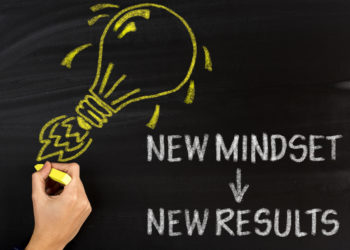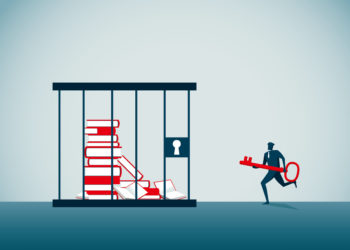Editor’s Note: Today’s post is by Bruce Rosenblum. Bruce is the Vice President of Content and Workflow Solutions at Atypon Systems, and the 2020 NISO Fellow. He was formerly CEO at Inera, which was acquired by Atypon in 2019.
The decision to disclose a disability or serious health condition in the workplace — especially a hidden one — is a decision that thousands of people face every day. They wonder, “If I disclose, will I get an interview?” “Will I be hired?” “Will I receive the support I need?” “Will my colleagues judge my performance differently?” “Will I be able to advance in my career?” Or worst, “Will my boss find a way to lay me off?”
Until three years ago, I had never given these questions any thought. So when a neurologist diagnosed me in August 2017 with ALS, I reacted with fear. Fear of the disease, fear of looming disability, and fear of disclosing.
I was fearful about how my colleagues would react, and what kind of impact disclosure might have on our team of a dozen people working for Inera, the company my wife founded in 1992. ALS is a fatal disease with no known cause or cure, and I did not want to cause fear among the customers with whom I work every day. Even before leaving the neurologist’s office, I knew that I could not disclose my diagnosis.
Disclosing a disability in the workplace is fraught with peril. But not disclosing carries a cost of staying silent. In a July 2019 New York Times article, Lizz Schumer wrote:
That bore out for Katie Rose Guest Pryal, a former academic who said keeping her mental illness a secret from her colleagues meant she could be only about 70 percent herself at work. “Keeping a major aspect of your identity a secret because you fear for the ramifications is not good for you,” she said. “But every time I sat down and weighed the positive and the negative, the negative of sharing outweighed the negative of keeping the secret.”
I also chose the path of “keeping the secret.” And it has been hard for me, as it is for so many others who choose the same path. Explaining how this feels can be difficult, but I will try to do so through vignettes of my journey from diagnosis to disclosure:
The day after I was diagnosed, I went right back to work. I hid in my office most of that first week. Several days later I received a text with a photo of my hour-old second grandchild. Instead of walking around the office and showing off my pride and joy to my colleagues, I went to a quiet unused office, lay down on the sofa, and cried for 15 minutes. For the next two years I went to work daily and hid an important part of me from my colleagues. In a June 2020 Wired Magazine article, the wife of ALS advocate Brian Wallach described the feeling:
“It was a very hard time,” Sandra says. “And we had a lot of fear. Is this a healthy situation for him to stay at this job, as much as he loves it?” Sandra also worried that, once they went public, Brian’s disease would shape the contours of every conversation. That it would take away whatever was left of normal.
Two weeks after diagnosis, I read about ALS online for the first time. So fearful am I of an accidental disclosure that I set my browser to Private mode, a habit I maintain for a year when reading about ALS.
Six weeks after diagnosis, my primary care physician asked if I had told anyone except my wife, who was with me when I received the diagnosis. “No,” I told him. He looked me in the eye and said: “Telling people about this is like ‘coming out,’” and sent me to meet with a psychologist. Six meetings later, I was ready to speak individually with my mother, my sister, and my adult children. Those meetings enabled me to speak with each family member with forethought, concern, and sensitivity.
Six months after diagnosis, I was accepted into a clinical trial for a promising ALS treatment. The 11-month trial required 14 hospital visits, including three overnight stays. I took three separate weeks of vacation to “hide” the time out of the office, and found creative ways to explain all the other days that I left early for appointments.
Nine months after diagnosis, I have dinner with a group of 15 colleagues at O’Hare while awaiting our post-SSP flight to Boston. One colleague starts to tell us about her neighbor who died the month before of ALS. I am simultaneously horrified and fascinated, wondering if the expression on my face or the questions I ask reveal anything. For days after, I feel like I’ve been in an episode of The Twilight Zone.
One year after diagnosis, my wife and I started the process of selling Inera because we knew that continuing to own and run the company we had built would not be sustainable as my physical strength declined. Through the winter and spring of 2019, I went to work every day holding not one, but two secrets: ALS, and the future of the company. The stress left me nauseous every morning.
Two years after diagnosis, we completed the sale of Inera to Atypon Systems. The day we announced the sale, our team was in a state of shock. It was not a good time to disclose, to explain why we had done this. Instead, we did everything we could to reassure the team about their future. I went back to the psychologist to prepare, and then six weeks later I started to tell my Inera and Atypon colleagues about my diagnosis in one-on-one conversations. Suddenly going to work every day became much less stressful, especially as my symptoms started to become more visible.
In November 2019, I faced our upcoming annual user group meeting. I was not ready to disclose beyond the small number of colleagues who already knew. I spent months obsessing over how I would answer anyone who asked why I was limping and walking with a cane. Shortly before the meeting, the answer came to me one night when an acquaintance asked about the cane and I replied, “It’s a long story.” It was a simple yet effective way to avoid “the conversation” that I was not yet ready to have in a larger setting.
Today, I am ready to disclose. I needed to reach a level of confidence about what I can do, despite my disability, to set aside my fear and write this post. And it is less difficult because I know that we have found a good home for Inera, one that will take care of our customers and employees. Inera continues to thrive as part of Atypon, building great products and providing first-class service to our customers while also participating in new and exciting joint initiatives with our new colleagues. Now is my time to disclose.
I hope that those with and without disabilities can learn from my fear of disclosure. However, each person’s experience is unique. For those who are uncomfortable with my approach, I apologize only because I am new to having a disability, and I am sure I do not fully appreciate the challenges of those who have been working with a disability for much or all of their life.
Today, three years after diagnosis, I still work full time, and I will continue to do so for as long as I am able. Fait accompli! If I have been working with a hidden disability, why should things change when it is disclosed? But they will change, because now I live in a world where “normal” is redefined, just as it is redefined for others with visible or disclosed disabilities. ALS and my disability do not define who I am, but they are part of me and my daily life. ALS defines the limits of how I interact with my physical world, but ALS does not define how my mind engages with the world.
To the few of you to whom I have previously disclosed, I am truly grateful. You have listened with empathy, given me your support, and respectfully maintained the confidence of my disclosure. You have recognized and accepted my growing physical limitations, and you have never discounted what I can do. But I am not unique. If my disability can be accepted, knowingly or unknowingly, in the workplace, why not other people’s disabilities? Everyone can do something, and that is the inclusion issue for all of us to consider. For those of you reading this post, I hope you will take this one paragraph to heart whenever someone with a disability chooses to disclose to you.
Now it is time for me to turn from fear to advocacy: advocacy in the ALS community, and advocacy for inclusion and equity for those who have disabilities. I invite you to join the upcoming SSP webinar, “Solving Problems with and for the Problem Solvers” on July 29 at 11 am EDT. Inspired by this Scholarly Kitchen post, my colleagues Simon Holt, Catherine Harding-Wiltshire, Lori Samuels, Parinay Malik, Sylvia Izzo Hunter, and I will have an open conversation about disabilities in the workplace, and how you can help address these challenges. We hope to see you there!
Thank you to Simon Holt for your comments on an early draft of this post.
Discussion
26 Thoughts on "Guest Post — Disclosing Disability in the Workplace"
Thank you Bruce for sharing your “coming out” story, which I found in equal parts moving, inspiring, and informative – I’m sure it will be appreciated by everyone who reads it, whether or not they have a disability. I wanted to take this opportunity to strongly encourage readers to sign up for the SSP webinar you mention on July 29. Having had the pleasure of sitting in on the recording, I can honestly say it was one of the most powerful discussions I’ve ever heard about the challenges and opportunities for people with a disability in our community. Thanks to you and the other participants for being willing to share your personal experiences – there’s a lot we can all learn from you!
Thank you for sharing Bruce.
Thank you for bravely sharing your story Bruce. This will touch a lot of people.
Bruce, this is beautiful. Thank you. You are brave and courageous. I always think that disclosure also means readiness to give of yourself. Thank you for that generosity.
I’ve been reading a lot about storytelling and the power of stories to help us understand in ways that other genres do not. Thank you for trusting us with your story.
Bruce, thank you so much for this post. At William & Mary’s Neurodiversity Initiative we have been working to support in all ways our faculty, staff and students with neurological differences (Autism, Tourette’s, ADHD, TBI, and much more). The “invisibility” of many disabilities is one of the things I relearn as an issue, over and over.
Thank you, Bruce, for telling your story so beautifully and for putting it into the context of what we can all do to better support colleagues with disabilities. Lots of love to you and your family as you continue adjusting to life with ALS.
Thank you Bruce for writing on such a difficult and personal topic. I’m sure there will be many people who will read this post and see themselves in a similar situation, for whom this small act will make a big difference. For everyone else this is a powerful lesson in how little we sometimes know about what other people are going through. Your story of leadership and advocacy may not be something you asked for, but please know how much it’s appreciated.
Thank you, Bruce, for sharing.
Bruce, your post is both enlightening and inspiring. It also teaches and informs those of us who have not yet faced such challenges in our own lives. When people we know and care about have the courage to share publicly, as you have, it opens the door for many conversations that we all will benefit from. Thank you! This brings another perspective to understanding the real meaning of diversity and inclusion. Judy
I really appreciate your disclosing your disclosure story, which seems to have taken place on your own terms and your own schedule. That’s great modeling for others living with invisible conditions as well as the visible. Thank you.
Thank you for sharing your story, Bruce. It is inspiring and helpful.
Bruce-
Thank you for your courage and your candor. Your example will serve others and be a light to many. Well-done.
Byron
Truly inspiring, thank you for sharing your story. Until people are comfortable self-identifying their disability, they cannot bring their whole self to the workplace.
Thank you both to Bruce for sharing this, and for the Scholarly Kitchen for publishing it. I think that this story – that it’s hard, and that it’s a journey – is often forgotten, because, by definition, normally those who speak out about disability are the ones who feel comfortable with it. I think yours is probably a journey shared by quite a lot of people, and hopefully this article will help more people who have to navigate it in the future. I also appreciate how readable and relatable this piece is.
This seems like an approach that members of the “great generation” would have taken, but you are probably a boomer. I think my children’s generation (ages 18 and 21) will not hold back and will find support amongst each other not stigma, but support for work, health, and community. I hope that is the case anyway and that I’m not seeing through rose colored glasses. I also hope for a cure for this terrible disease. Thank you for sharing what you had to go through.
This is an important topic, Bruce, and I thank you for bringing it to light.
Every day, I am more honored to be your friend.
Thank you for sharing your story, Bruce. Your strength of character shines through. It will be an inspiration to many in similar circumstances, and a lesson for all of us when considering every person’s individual circumstances. I have great faith in our future industry leaders who are so alive to the equality and diversity challenge.
Bruce, I am really proud of the courage it took for you to disclose your ALS diagnosis in a public forum and to use it to advocate for equity and inclusion in the workplace.
Building Inera with you by my side has been an amazing journey.
Wow. What a powerful piece. I am speechless really but just wanted to say that I very much appreciate you sharing your story.
Bruce, thank you so much for sharing your story with us. You are an inspiration, and I wish both you and Irina strength and love as you continue your journey.
I am holding back tears. My father-in-law had ALS and your story reminds me of the many layers of complexity surrounding his battle. His name happened to be Bruce Rosenburg, so when I first saw this post, I was jolted because I read your name incorrectly.
Wishing you peace and strength as you journey on.
Thank you, Bruce, for this fine essay. I have now shared it with some literarily inclined medical students, and I may use it in future teaching. My thoughts are with you.
Bruce, thank you for your candor in sharing your story. Warm wishes to you & your family as you continue to navigate bravely.
Bruce, thank you for your willingness to open up and share your story. Hopefully, it will give others courage to do the same. Best wishes to you and your family as you work through this very difficult time.



